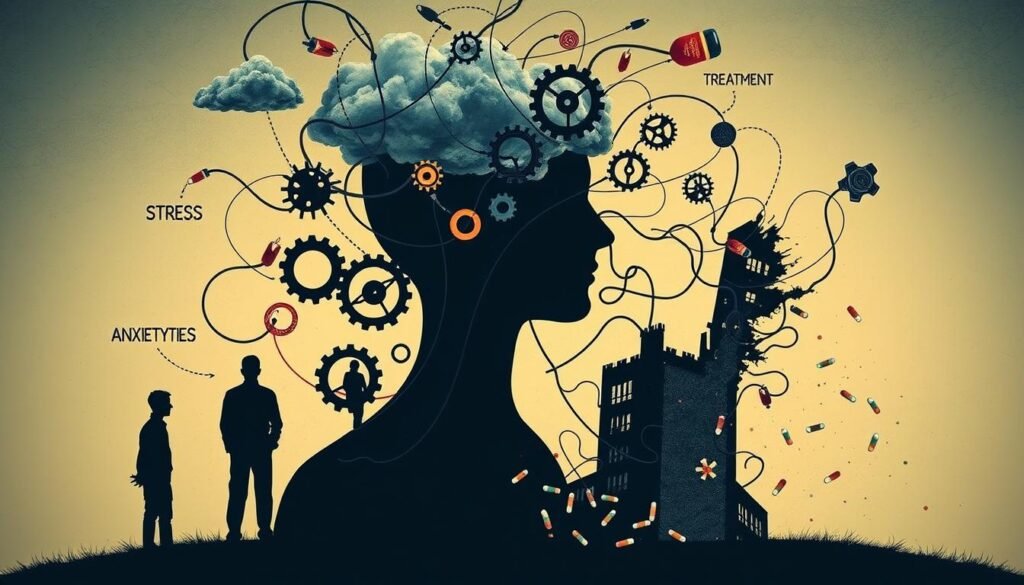Did you know over 19 percent of U.S. adults had an anxiety disorder last year? This shows how common anxiety is today. Many wonder: Is anxiety curable? We’ll explore anxiety, its forms, and the available anxiety treatment options in this piece.
Anxiety can disrupt daily life. But knowing its symptoms and treatments helps people get the help they need for managing anxiety disorder. Let’s walk you through anxiety’s effects, how it can be treated, and ways to beat it.
Key Takeaways
- Over 19% of U.S. adults suffer from an anxiety disorder annually.
- Anxiety disorders are the most common type of mental health disorders.
- Many effective treatment options, including therapy and medication, are available.
- Understanding the symptoms is crucial for timely intervention.
- Support networks play a vital role in overcoming anxiety.
Understanding Anxiety and Its Impact
Anxiety affects many people in different ways. Almost 20% of American adults deal with anxiety disorders annually. To understand anxiety, we must look at its signs. These signs can change how someone feels and acts every day.
What is Anxiety?
Anxiety is when you feel worried, nervous, or stressed about what might happen. It helps us recognize possible dangers. But, too much anxiety can cause mental health issues.
Emotional and Physical Symptoms of Anxiety
It’s important to know the emotional signs of anxiety. They include feeling overly worried, getting irritated easily, and not being able to sit still.
- Excessive worrying
- Irritability
- Restlessness
Along with these feelings, anxiety has physical signs. These make the situation tougher. Common ones are:
- Rapid heart rate
- Shortness of breath
- Sweating
- Fatigue
- Headaches or stomachaches
These signs could mean someone has an anxiety disorder like GAD or panic disorder. GAD makes people worry all the time, affecting their daily life. Panic disorder causes sudden panic attacks, bringing extreme fear and physical reactions. Knowing these symptoms helps us comprehend anxiety’s effect on life.
| Disorder | Emotional Symptoms | Physical Symptoms |
|---|---|---|
| Generalized Anxiety Disorder (GAD) | Persistent worry, irritability, restlessness | Headaches, fatigue, difficulty concentrating |
| Panic Disorder | Intense fear, feelings of impending doom | Pounding heart, sweating, trembling |
| Social Anxiety Disorder | Fear of being judged, avoidance of social situations | Rapid heartbeat, blushing, trembling |
Knowing the emotional and physical signs of anxiety can lead to help sooner. This support can greatly improve someone’s life.
Distinguishing Anxiety from Anxiety Disorders
Anxiety is common and ranges in severity. Knowing when it turns into a disorder is key for the right help. Normal anxiety is different from anxiety disorders, which majorly impact life. Recognizing various anxiety disorders helps spot when professional help is needed.
Types of Anxiety Disorders
Anxiety disorders vary greatly and affect people in unique ways. Each has its own symptoms and ways to manage. Here are some well-known types:
- Generalized Anxiety Disorder (GAD): Known for constant and intense worry lasting six months or more.
- Panic Disorder: Features sudden panic attacks that happen without warning or from stress.
- Social Anxiety Disorder: Causes extreme fear of social situations affecting normal life like work or school.
- Specific Phobias: Includes severe fear of certain things or situations that are actually not dangerous.
- Obsessive-Compulsive Disorder (OCD): Often starts in young age, marked by unwanted thoughts and repetitive actions.
When Does Anxiety Become a Disorder?
Knowing when anxiety turns into a disorder is crucial. It becomes a disorder when:
- It’s severe, constant, and sticks around.
- It greatly disrupts someone’s life at work or home.
- People start to avoid things that make them anxious, hurting their relationships and daily tasks.
- They start having physical issues like headaches, trouble sleeping, and feeling tired.
Understanding these signs helps in getting help early. Anxiety disorders can improve with therapy, medicine, and changes in lifestyle.
Is Anxiety Curable?
Is it possible to cure anxiety? This question touches on different aspects of mental health. While many find ways to control their symptoms, getting rid of anxiety completely is complicated. The link between genetics and how we experience anxiety is key.
Can Anxiety Be Completely Eliminated?
Therapies like Cognitive Behavioral Therapy (CBT) have been quite effective for anxiety. However, many still struggle. Is it possible to fully eliminate anxiety? The answer is complex. Feeling stressed or anxious is part of being human. Through therapy, changing lifestyles, and support, many see great improvements. But, due to its roots, some anxiety might stick around.
The Role of Genetics and Environment
Anxiety isn’t a standalone issue. Our genes play a big role in anxiety disorders. If anxiety runs in the family, it might be more likely for you to experience it too. Trauma, big life changes, and certain lifestyle choices show how genetics and environment are closely connected. Understanding these links is crucial for personalized treatments that better manage anxiety.
Common Risk Factors for Anxiety Disorders
Anxiety disorders come from different sources, affecting everyday life deeply. Knowing these causes helps in preventing and handling anxiety. There are two major risk areas: genetics and environmental stressors. Both play roles in the onset and intensification of symptoms.
Genetic Influences on Anxiety
The role of genetic influences on anxiety is significant in the risk of anxiety disorders. If anxiety runs in the family, a person is more likely to face it too. This suggests genes related to anxiety lay the groundwork for related issues. Research finds that nearly 30% of adults might face anxiety disorders in their lives. This highlights the need to understand genetic connections.
Environmental Stressors and Their Effects
Environmental stressors include many things that can trigger anxiety in those prone to disorders. Traumatic events, major life changes, or constant stress from work or personal issues are examples. Early exposure to negative experiences can increase the anxiety disorder risk, like generalized anxiety or social anxiety disorder. Knowing these factors can help in finding ways to lessen their impact. For a closer look at these risks, visit this detailed resource.

Effective Treatments for Managing Anxiety
Finding the right way to treat anxiety is crucial for those suffering from it. Therapy and medications tailored to individual needs can make a big difference. Knowing what options are out there can really help improve life quality.
Therapy Options for Anxiety
Cognitive Behavioral Therapy (CBT) is a popular choice for treating anxiety. It changes negative thinking patterns to lessen anxiety symptoms. Many people notice a big improvement after 8 to 10 sessions.
Exposure Therapy works by slowly facing what scares you, reducing anxiety over time. Online therapy has also become popular and works as well as in-person sessions. It helps by making therapy accessible to more people. Within CBT, techniques like thought challenging and systematic desensitization build up confidence in dealing with anxiety.
Medications for Anxiety Management
Medicines are important for managing anxiety along with therapy. Anti-anxiety drugs and some antidepressants, like SSRIs, are commonly used. They adjust brain chemicals to relieve anxiety symptoms for many people.
Talking with healthcare providers is key to finding the best medication. With the right therapy and medication, most people see better results in their fight against anxiety.
| Type of Treatment | Description | Effectiveness |
|---|---|---|
| Cognitive Behavioral Therapy (CBT) | Focuses on changing negative thought patterns | Significant improvement in 8-10 sessions |
| Exposure Therapy | Gradual exposure to feared situations | Effective in long-term anxiety reduction |
| Online Therapy | Access therapy through digital platforms | Comparable effectiveness to in-person therapy |
| Anti-Anxiety Medications | Medications targeting anxiety symptoms | Quick relief and management of anxiety |
| Antidepressants (SSRIs) | Medications that balance neurotransmitters | Long-term management of anxiety symptoms |
Natural Remedies for Reducing Anxiety Symptoms
Many people look for natural ways to ease anxiety alongside traditional treatments. Doing things like meditation and exercising daily can help lessen anxiety symptoms. Eating a well-balanced diet is also key, providing nutrients that help keep emotions steady.
Practices to Consider: Meditation and Exercise
Meditation is a strong method for reducing stress and anxiety. Studies show that practicing mindfulness can work as well as some medications for anxiety. It can help people find better ways to cope and make them emotionally stronger.
Being active is essential in fighting anxiety. People who exercise regularly are less likely to suffer from anxiety. Physical activities release endorphins, making us feel happier. Even simple activities like walking or yoga can improve our mental health a lot.
The Benefits of a Balanced Diet
Eating right is crucial for both our minds and bodies. A diet full of fruits, vegetables, lean meats, and good fats helps our brain and mood. Nutrients like omega-3 fatty acids and antioxidants can help reduce anxiety.
To help with anxiety, avoiding caffeine, alcohol, and smoking is a good idea. These can make stress worse. Things like chamomile and lavender can have a calming effect, helping to manage anxiety better.

Using these natural approaches for dealing with anxiety can pave the way for a more holistic recovery. Regular meditation, exercise, and eating mindfully lay the groundwork for better mental health.
To dive deeper into understanding anxiety’s physical effects, check out resources like recognizing warning signals of anxiety disorders.
Coping with Anxiety: Strategies and Tips
Dealing with anxiety means finding ways to handle daily challenges. People can learn coping methods that reduce symptoms and boost mental health. These methods include exercises and finding supportive groups for help and advice.
Developing Healthy Coping Mechanisms
It’s key to use healthy methods to deal with anxiety. Deep breathing, mindfulness, and writing in a journal help a lot. Studies show that writing about your feelings lessens anxiety and stress. Adding exercise and meditation builds strength against anxiety.
For tension relief, try to get either 75 minutes of hard or 150 minutes of easy exercise every week. Mindfulness is vital too. It teaches you to accept your feelings without judgment, making you feel grounded when anxious. For more tips, check out this guide.
Support Networks and Their Importance
Support networks are key in dealing with anxiety. Having close ties with friends, family, or groups gives crucial emotional support. Studies show being connected helps you handle stress better, proving the importance of these bonds.
Connecting with others creates belonging and reduces loneliness. Finding groups where you can talk openly about anxiety helps grow coping skills. A strong support circle gives you strength to tackle problems, showing how valuable relationships are in managing anxiety.
Overcoming Anxiety: Success Stories
Sharing inspiring stories of people beating anxiety gives others hope. These stories show that overcoming anxiety is possible with treatment, self-care, and community support. They highlight the power of recovery.
Real-Life Testimonials of Recovery
Andrew, a 29-year-old teacher, faced anxiety during big life changes like losing his job and becoming a parent. He spent thousands of hours learning about anxiety online. A book by Paul changed his outlook. After two years of psychiatric help, he improved a lot. He used to depend on medication but eventually didn’t need it anymore.
Maria dealt with daily anxiety and felt disconnected from herself. She learned to see anxiety in a new light, as something helpful. This mindset helped Maria overcome her fears. She learned to grow from her anxiety triggers.
Role of Community Support in Overcoming Anxiety
Community support is crucial for mental health. Andrew found strength in community by organizing charity events. These events connected people and helped Andrew in his recovery. Sharing these success stories shows how coming together helps in overcoming anxiety.

| Individual | Journey Highlights | Key Outcomes |
|---|---|---|
| Andrew | Faced anxiety from life changes, researched extensively, transformed mindset | 70% improvement in managing emotions, no longer took medication |
| Maria | Endured daily anxiety, viewed triggers as growth opportunities, embraced emotions | Newfound attitude towards anxiety, desensitized fear response |
These stories tell us that recovery isn’t easy. But with hard work and support from others, it leads to hope and resilience.
Living with Anxiety: What You Should Know
Living with anxiety means constantly managing your symptoms. It’s important for those affected to find ways to deal with anxiety daily. Knowing about healthy habits, relaxation, and self-care is key. These methods help control symptoms and improve overall well-being.
Managing Anxiety in Daily Life
A structured routine helps those with anxiety feel stable. Adding regular workouts, mindfulness, and good sleep habits helps reduce symptoms. Here are useful tips to use every day:
- Establish a daily schedule to provide a sense of normalcy.
- Engage in physical activity regularly.
- Practice relaxation techniques like deep breathing or meditation.
- Limit caffeine and alcohol intake, as these can exacerbate anxiety symptoms.
- Ensure adequate sleep to improve mood and cognitive function.
Signs That It’s Time to Seek Help
Sometimes, self-help is not enough, and you may need professional help. Knowing when to get help is crucial for better life quality:
- Persistent worry or fear that interferes with daily activities.
- Avoidance of social situations or activities once enjoyed.
- Physical symptoms such as rapid heart rate, dizziness, or shortness of breath.
- Increased irritability and difficulty concentrating.
- Feelings of hopelessness or overwhelming sadness.
Getting help at the right time leads to better results in managing anxiety. Reaching out for help shows strength. Therapy or counseling offers valuable skills and strategies for coping.
Conclusion
Dealing with anxiety involves many strategies. These include medical, psychological, and lifestyle changes. It might not be fully curable, but managing it effectively is crucial. This can really help reduce symptoms and boost well-being. With the right treatments and a strong commitment, people can handle their anxiety better.
About 301.39 million people globally were affected by anxiety in 2019. This number grew by 76.2 million because of COVID-19. Anxiety hits hard in different groups, like medical students who have a high rate of 33.8%. This shows how critical it is to have treatments that really work.
Studies give us hope, especially about cognitive-behavioral therapy (CBT). CBT has been great at lessening anxiety symptoms. Results from CBT can last up to 12 months. And, in some cases, the benefits continue for nearly 4 years. These results underline the importance of tailoring therapy and medication to fit each person. If you’re interested in anxiety treatments, check out this helpful link.